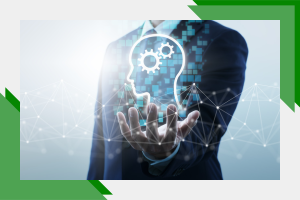At North Shore Systems we understand that in a rapidly evolving digital landscape, automation technologies like intelligent automation (IA) and artificial intelligence (AI) are constantly transforming the way businesses operate. Although the terms often mistakenly used interchangeably, there are key differences that distinguish these two unique technologies. Here is a breakdown of what sets intelligent automation vs artificial intelligence apart and how each of them can individually benefit your organization.
What is Intelligent Automation (IA)
Intelligent automation is the combination of robotic process automation (RPA) and artificial intelligence (AI) to automate routine and complex business tasks. While traditional automation follows predefined rules for simple and repetitive processes, IA handles more complex processes, as it introduces cognitive capabilities which allow systems to adapt, learn, and make decisions based on data.
Essentially, IA is driven by business rules, algorithms, and AI models. This enables it to handle tasks like extracting information from documents, performing real-time analysis, and automating decision making. At North Shore Systems, we use IA in The CREF Operating System™ to automate high-volume data entry, generate reports, and even perform variance analysis or compliance monitoring. This is all done while learning from new data, continually improving its performance. IA is a great addition to any software suite as it improves efficiency, reduces operational costs, and supports informed decision-making by automating complex workflows that were previously dependent upon human intervention.
Pros of IA
Empowering business users to manage automation workflows is a key advantage of intelligent automation that ultimately gives the company greater control and agility. It also increases overall efficiency by streamlining repetitive, time-consuming tasks. Implementing IA technology frees up more of employees’ time to focus on strategic and value-adding activities.
Beyond operational efficiency, IA improves accuracy by minimizing human errors. This can particularly be seen in high-volume tasks such as data entry or report generation. By automating workflows, IA helps corporations make informed decisions in real time. Incorporating IA into business operations also improves scalability, allowing companies to handle growing workloads without a proportional increase in their workforce.
Ultimately, when there is a reduction in errors and an increase in optimization of resources and productivity, users tend to see a decline in operational costs. When employees are freed from repetitive tasks, overall workplace satisfaction increases as they can focus on more meaningful work.
Cons of IA
In the comparison of intelligent automation vs artificial intelligence, IA offers numerous advantages, but also comes with some downsides. The most notable drawback is its limited adaptability when it comes to unforeseen changes or complex scenarios. Since IA relies on predefined algorithms and rules, it struggles to comprehend any tasks that fall outside of its predetermined guidelines.
The extensive initial setup is another limitation of IA software. Designing, configuring, and maintaining automated workflows can demand a significant investment of time and resources. In addition, IA systems often require frequent monitoring and updating to ensure they stay up to date and align with the evolving business needs and/or market conditions.
Use Cases of IA
- IA has the ability to automate high-volume data entry significantly improving overall accuracy and efficiency in routine tasks.
- It automatically generates emails based on specific pre-determined data conditions, ensuring timely communication.
- IA is capable of reading emails, extracting relevant data, and launching workflows, streamlining manual processes.
- By automating file movements and administrative tasks, IA streamlines file transfers and routine administrative functions, ultimately helping businesses save time and reduce operational bottlenecks.
- IA processes big data and organizes vast amounts of information to support more informed decision-making.
- It automates normalization, variance analysis, and covenant monitoring, ensuring compliance with financial agreements.
- IA also generates and distributes reports based on predefined templates and rules, simplifying the reporting process.
What is Artificial Intelligence (AI)
Alternatively, artificial intelligence encompasses technologies that enable machines to perform tasks that would typically require human intelligence. AI enables computers to mimic cognitive functions such as learning, reasoning, problem-solving, etc. In other words, machine learning (ML) allows AI systems to learn from data patterns and improve over time without explicit programming and natural language processing (NLP). NLP enables machines to understand and respond to human language.
AI systems in The CREF Operating System™ are designed to process vast amounts of data, recognize patterns, and make predictions or decisions, oftentimes more quickly and accurately than a human is able to. When it comes to the commercial real estate or finance industries, AI can analyze large datasets to identify trends, assess risk, or predict property values. AI is often found in the form of virtual assistants or recommendation systems. In terms of technological advancement, this software brings a lot to the table. As AI continues to evolve its role in industries like finance and real estate is increasing, revolutionizing how businesses operate by enhancing productivity and enabling more informed decision-making.
Pros of AI
Artificial intelligence offers a range of great benefits. One of its main advantages is the ability to handle complex tasks and learn from data. Since AI systems are able to quickly process large amounts of data, they can detect patterns, make informed decisions, and provide actionable insights that might be difficult for humans to manually achieve. Over time, AI adapts and improves as it is exposed to more data and feedback. This helps it become more accurate and efficient in its predictions and outputs.
The automation of repetitive tasks allows employees to focus on creative, strategic, or high-value work. Thus, enhancing workplace productivity and efficiency. Additionally, AI’s capacity to analyze large datasets and provide real time insights helps businesses make faster, data-driven conclusions. This improves the decision quality by eliminating potential biases or errors from manual analysis.
AI’s scalability allows it to process and analyze huge volumes of information without compromising accuracy or speed. In industries such as finance or real estate this is particularly helpful as large datasets are extremely common. This capability helps companies reduce operational costs while fostering innovation by uncovering new opportunities with their data.
Cons of AI
While AI may seem like an ideal solution, it has its own cons that users should be aware of. A primary disadvantage of artificial intelligence is its dependence on substantial data and computational resources. Without access to clean, structured, and updated data, AI performance often declines, unfortunately leading to inaccurate predictions and/or flawed outputs.
Additionally, AI lacks contextual understanding and common sense reasoning, limiting its ability to make nuanced decisions in complex or ambiguous situations. Although AI excels at automating repetitive tasks and processing data, tasks that require emotional intelligence or deep contextual understanding pose great difficulty for AI. Thus, in situations where human judgement is critical AI systems become less reliable.
Use Cases of AI
- AI can extract and interpret data from structured, semi-structured, and unstructured documents, such as financial statements, making data handling more efficient and accurate.
- It automates variance analyses and normalizations, performs automatic covenant testing, and sends loan-related notifications, enhancing accuracy and reducing manual intervention.
- Artificial Intelligence provides insights into property values, loan performance, and portfolio management, enabling more informed decision-making through advanced data analysis.
- It enables the creation of customized and sophisticated reports by utilizing AI-driven insights, helping businesses gain a deeper understanding of their data.
- AI can be leveraged for property valuation, predicting property values based on a wider range of data inputs and market trends.
Intelligent Automation vs Artificial Intelligence: Which is Better?
The choice between IA and AI depends on your specific needs, goals, and the complexity of the tasks you’re looking to automate. For repetitive, rule-based tasks, IA is likely the better fit as it provides efficiency and ease of management. IA empowers businesses to automate routine processes like data entry, report generation, or compliance monitoring. Ultimately, this improves operational efficiency and reduces costs. If you’re looking for quick automation wins with little company disruption, IA can offer immediate value by automating high-volume, predictable tasks with precision and accuracy.
However, if you have more complex, data-driven tasks that require learning and adaptation, AI is the better selection as it offers advanced capabilities and greater potential for innovation. Environments where data is abundant and the need for insights, predictions, and advanced decision-making is crucial is where AI thrives. AI’s ability to process large datasets, detect patterns, and learn over time offers a level of intelligence that IA cannot match.
In the end, the decision between IA and AI often comes down to your company’s goals and resources. Both IA and AI offer immense benefits to modern technology strategies. A hybrid approach, as implemented in The CREF Operating System™, is oftentimes most beneficial as it combines the strengths of both softwares. By integrating IA for handling routine tasks and leveraging AI for more complex analysis and decision-making, companies can achieve both efficiency and innovation.
Ultimately, in the debate between intelligent automation vs artificial intelligence, neither option is necessarily “better” than the other as they each provide unique enhancements to your daily productivity. Understanding their differences allows you to leverage each appropriately to enhance your systems and practices.



